Libya profile - Timeline
- Published
A chronology of key events:
7th century BC - Phoenicians settle in Tripolitania in western Libya, which was hitherto populated by Berbers.
6th century BC - Carthage conquers Tripolitania.
4th century BC - Greeks colonise Cyrenaica in the east of the country, which they call Libya.
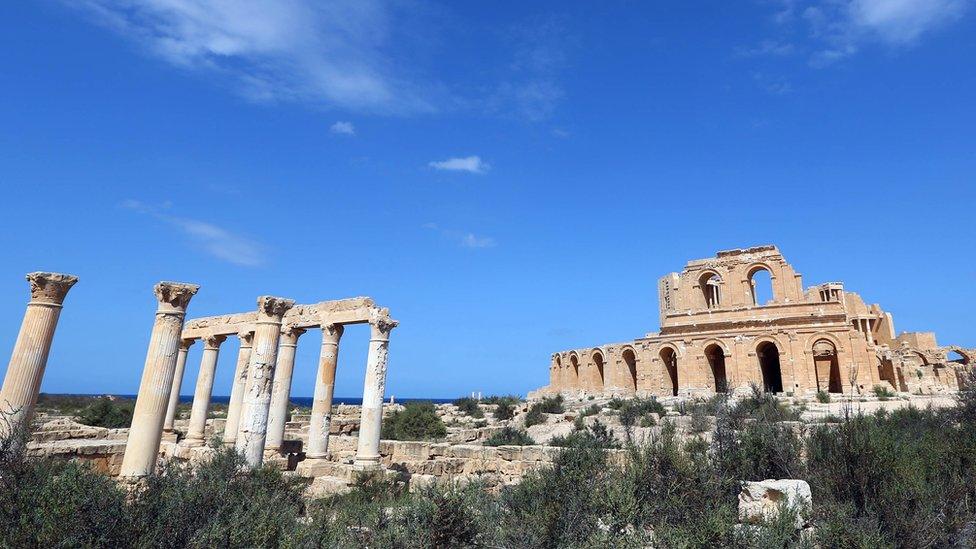
The ancient city of Sabratha prospered under the Romans. It is one of numerous historic sites to be seen in Libya
74 BC - Romans conquer Libya.
AD 643 - Arabs under Amr Ibn al-As conquer Libya and spread Islam.
16th century - Libya becomes part of the Ottoman Empire, which joins the three provinces of Tripolitania, Cyrenaica and Fezzan into one regency in Tripoli.
Italian rule
1911-12 - Italy seizes Libya from the Ottomans. Omar al-Mukhtar begins 20-year insurgency against Italian rule.
1920s - Libyan resistance grows as Senussi dynasty joins in alongside the Mukhtar campaign.
1931 - Italy breaks resistance through combination of major armed operations and concentration camps for rebel population. Al-Mukhtar is captured and executed.
1934 - Italy unites the provinces as the colony of Libya and steps up Italian migration as part of an eventual plan for the incorporation of Libya into a Greater Italy.
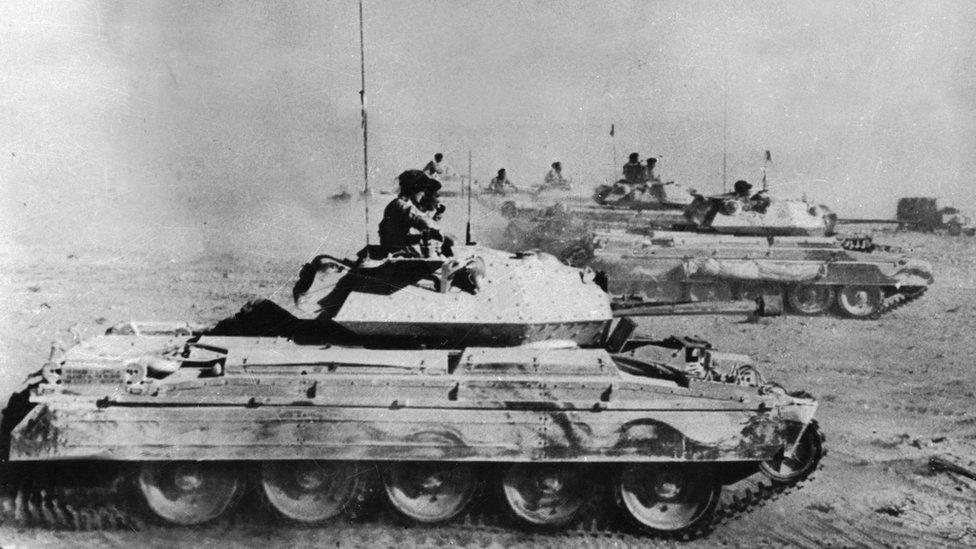
Libya was a major battleground during World War Two
1942 - Allies oust Italians from Libya, which is then divided between the French, who administer Fezzan, and the British, who control Cyrenaica and Tripolitania.
1951 - Libya becomes independent under King Idris al-Sanusi.
1956 - Libya grants two American oil companies a concession of some 14 million acres.
1961 - King Idris opens a 104-mile pipeline, which links important oil fields in the interior to the Mediterranean Sea and makes it possible to export Libyan oil for the first time.
The Gaddafi era
1969 - King Idris deposed in military coup led by Col Muammar Gaddafi, who pursues a pan-Arab agenda by attempting to form mergers with several Arab countries, and introduces state socialism by nationalising most economic activity, including the oil industry.
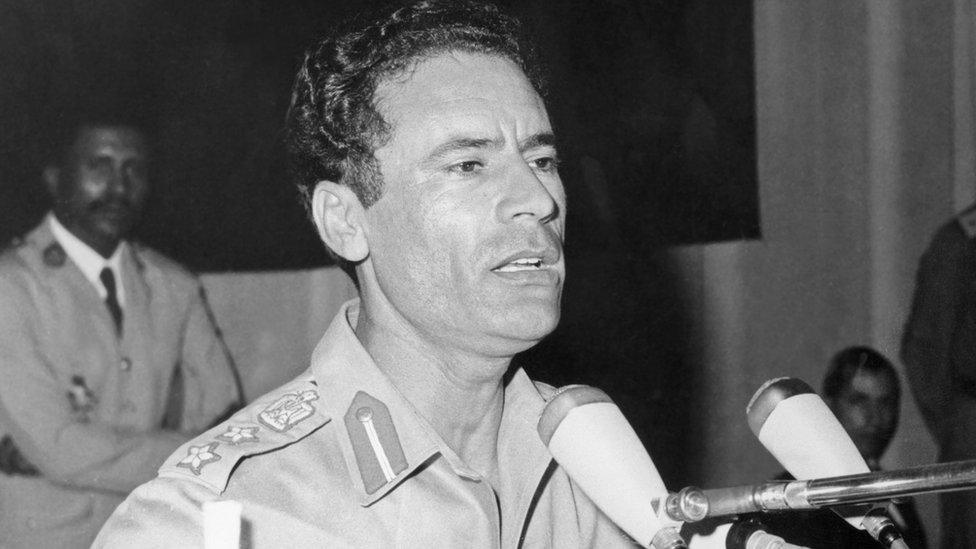
Colonel Gaddafi deposed the king in 1969 and ruled until he was killed in 2011
1970 - Libya orders the closure of a British airbase in Tobruk and the giant US Wheelus air force base in Tripoli; property belonging to Italian settlers nationalised.
1971 - National referendum approves proposed Federation of Arab Republics (FAR) comprising Libya, Egypt and Syria. However, the FAR never takes off.
1973 - Col Gaddafi declares a "cultural revolution", which includes the formation of "people's committees" in schools, hospitals, universities, workplaces and administrative districts; Libyan forces occupy Aozou Strip in northern Chad.
1977 - Col Gaddafi declares a "people's revolution", changing the country's official name from the Libyan Arab Republic to the Great Socialist People's Libyan Arab Jamahiriyah and setting up "revolutionary committees" - heralding the start of institutionalised chaos, economic decline and general arbitrariness.
1980 - Libyan troops intervene in civil war in northern Chad.
Confrontation with the US
1981 - US shoots down two Libyan aircraft which challenged its warplanes over the Gulf of Sirte, claimed by Libya as its territorial water.
1984 - UK breaks off diplomatic relations with Libya after a British policewoman is shot dead outside the Libyan embassy in London while anti-Gaddafi protests were taking place.
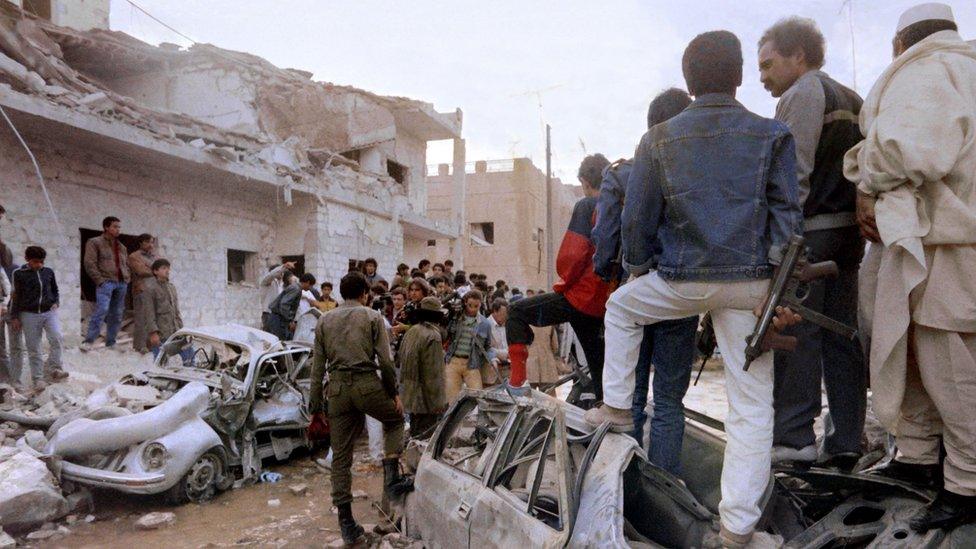
The US bombed Tripoli in retaliation for alleged Libyan attacks on American interests
1986 - US bombs Libyan military facilities, residential areas of Tripoli and Benghazi, killing 101 people, and Gaddafi's house, killing his adopted daughter. US says raids were in response to alleged Libyan involvement in bombing of Berlin disco frequented by US military personnel.
Lockerbie plane bombing
1988 December - Lockerbie bombing - an airliner is blown up over the Scottish town of Lockerbie, allegedly by Libyan agents.
1989 - Libya, Algeria, Morocco, Mauritania and Tunisia form the Arab Maghreb Union.
1992 - UN imposes sanctions on Libya in an effort to force it to hand over for trial two of its citizens suspected of involvement in the Lockerbie bombing.
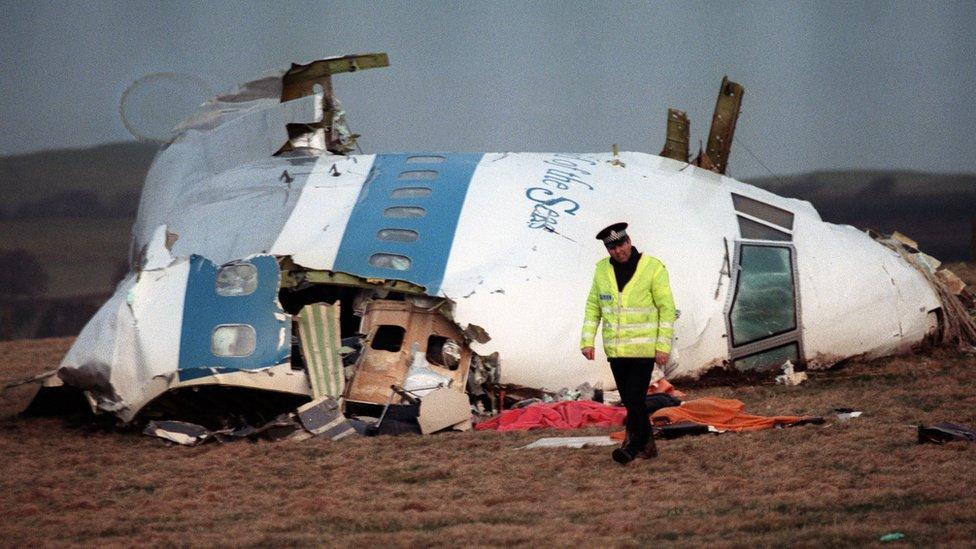
Libya was accused of involvement in the downing of the 747 PanAm airliner that exploded and crashed over Lockerbie, Scotland
1994 - Libya returns the Aozou Strip to Chad.
1995 - Gaddafi expels some 30,000 Palestinians in protest at the Oslo accords between the Palestine Liberation Organisation and Israel.
1999 - Lockerbie suspects handed over for trial in the Netherlands under Scottish law; UN sanctions suspended; diplomatic relations with UK restored.
2000 September - Dozens of African immigrants are killed by Libyan mobs in the west of Libya who were said to be angry at the large number of African labourers coming into the country.
Lockerbie sentence
2001 31 January- Special Scottish court in the Netherlands finds one of the two Libyans accused of the Lockerbie bombing, Abdelbaset Ali Mohamed al-Megrahi, guilty and sentences him to life imprisonment. Megrahi's co-accused, Al-Amin Khalifa Fahimah, is found not guilty and freed.
2001 May - Libyan troops help to quell a coup attempt against President Ange-Felix Patasse of the Central African Republic.
2002 January - Libya and the US say they have held talks to mend relations after years of hostility over what the Americans termed Libya's sponsorship of terrorism.
2002 14 March - The Libyan man found guilty of the Lockerbie bombing, Abdelbaset Ali Mohmed al-Megrahi, loses his appeal against the conviction and begins a life sentence of at least 20 years.
Compensation
2003 January - Libya is elected chairman of the UN Human Rights Commission despite opposition from the US and human rights groups.
2003 August - Libya signs a deal worth $2.7bn to compensate families of the Lockerbie bombing victims. Libya takes responsibility for the bombing in a letter to the UN Security Council.
2003 September - UN Security Council votes to lift sanctions.
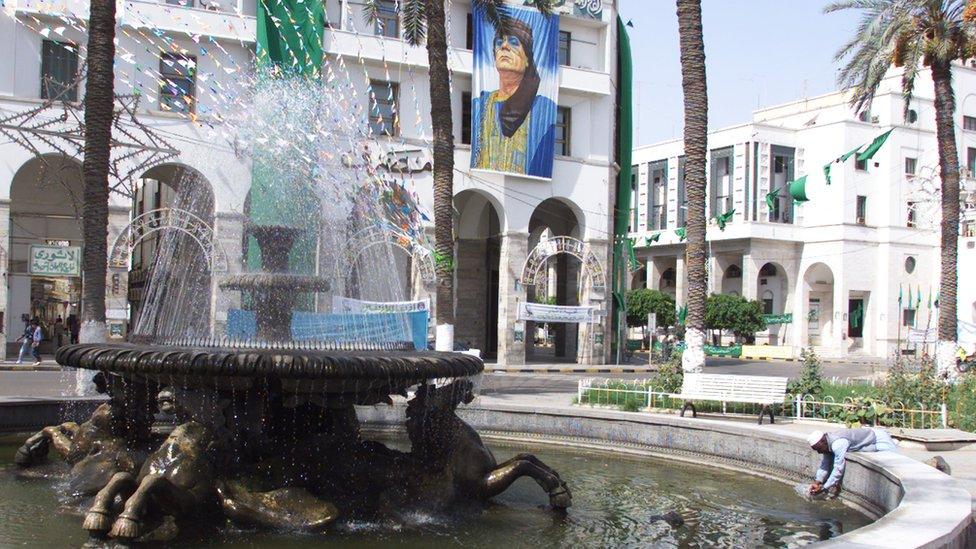
Col Gaddafi developed a cult of personality and his pictures could be seen all over the country
2003 December - Libya says will abandon programmes to develop weapons of mass destruction.
2004 January - Libya agrees to compensate families of victims of 1989 bombing of French passenger aircraft over Sahara.
2004 March - British Prime Minister Tony Blair visits, the first such visit since 1943.
Return to respectability
2004 May - Five Bulgarian nurses and a Palestinian doctor are sentenced to death having been accused of deliberately infecting some 400 children with HIV. They are eventually freed under a deal with the EU.
2004 August - Libya agrees to pay $35m to compensate victims of the bombing of a Berlin nightclub in 1986.
2005 January - Libya's first auction of oil and gas exploration licences heralds the return of US energy companies for the first time in more than 20 years.
2006 February - At least 10 people are killed in clashes with police in Benghazi, part of a wave of international protests by Muslims who are angered by a Danish newspaper's cartoon depictions of the Prophet Muhammad.
2006 May - The US says it is restoring full diplomatic ties with Libya.
2008 January - Libya takes over one-month rotating presidency of the UN Security Council in a step back to respectability after decades as a pariah of the West.
2008 August - Libya and US sign agreement committing each side to compensate all victims of bombing attacks on the other's citizens.
Italian Prime Minister Silvio Berlusconi apologises to Libya for damage inflicted by Italy during the colonial era and signs a five billion dollar investment deal by way of compensation.
2008 September - US Secretary of State Condoleezza Rice makes historic visit - the highest-level US visit to Libya since 1953. Ms Rice says relations between the US and Libya have entered a "new phase".
2009 February - Gaddafi elected chairman of the African Union by leaders meeting in Ethiopia. Sets out ambition of "United States of Africa" even embracing the Caribbean.
2009 June - Gaddafi pays first state visit to Italy, Libya's former colonial ruler and now its main trading partner.
Al-Megrahi released
2009 August - Lockerbie bomber Abdelbaset Ali al-Megrahi is freed from gaol in Scotland on compassionate grounds and returned to Libya. His release and return to a hero's welcome causes a storm of controversy.
2010 January - Russia agrees to sell Libya weapons in a deal worth $1.8bn. The deal is thought to include fighter jets, tanks and air defence systems.
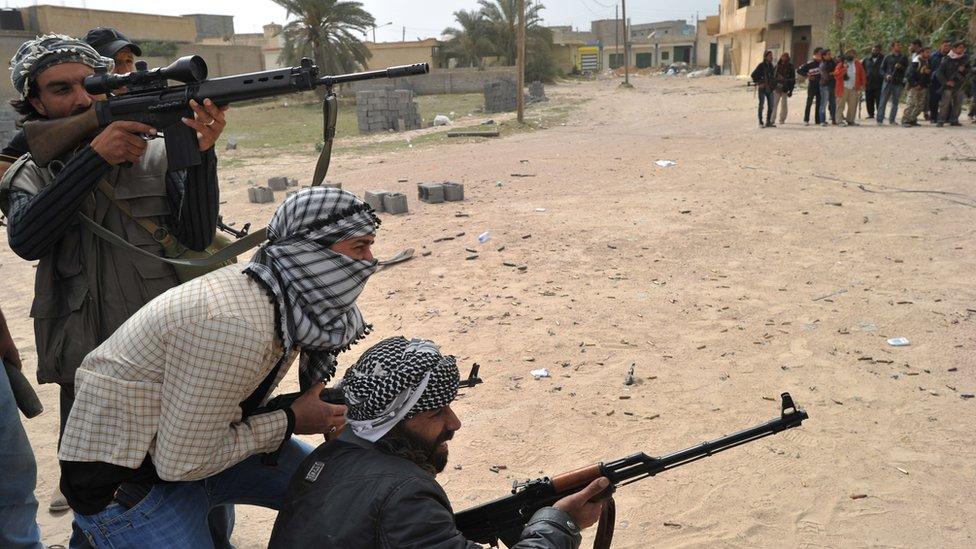
Libyans rose up against the rule of Col Gadaffi, and many took up arms
2010 June - UN refugee agency UNHCR expelled.
BP confirms it is about to begin drilling off Libyan coast.
2010 October - European Union and Libya sign agreement designed to slow illegal migration.
Anti-Gaddafi uprising
2011 February - Inspired by revolts in other Arab countries, especially neighbouring Egypt and Tunisia, violent protests break out in Benghazi, spread to other cities, leading to escalating clashes between security forces and anti-Gaddafi rebels.
2011 March - UN Security Council authorises a no-fly zone over Libya and air strikes to protect civilians, over which NATO assumes command.
Libyan rebels initially capture territory but are then forced back by better-armed pro-Gaddafi forces.
2011 July - The international Contact Group on Libya formally recognises the main opposition group, the National Transitional Council (NTC), as the legitimate government of Libya.
2011 August - Col Gaddafi goes into hiding after rebels swarm into his fortress compound in Tripoli.
2011 August-September - African Union joins 60 countries which have recognised the NTC as the new Libyan authority.
2011 20 October - Col Gaddafi is captured and killed as rebel fighters take his hometown Sirte. Three days later, the NTC declares Libya to be officially "liberated" and announces plans to hold elections within eight months.
2011 November - Saif al-Islam, the fugitive son of former Libyan leader Muammar Gaddafi, is captured, becoming the last key Gaddafi family member to be seized or killed.
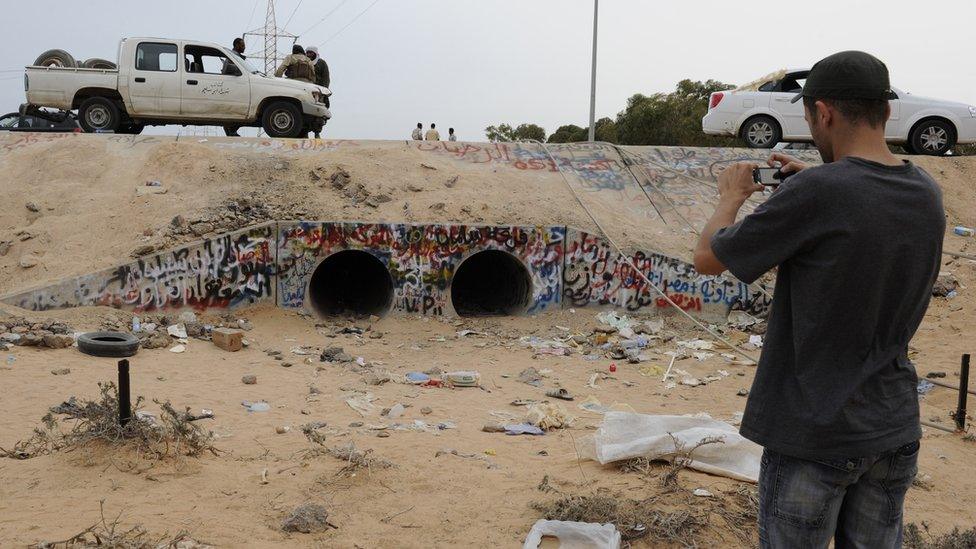
Col Gadaffi tried to hide in a drain but was captured and killed
2012 January-March - Clashes erupt between former rebel forces in Benghazi in sign of discontent with the NTC. Benghazi-based NTC officials campaign to re-establish autonomy for the region, further increasing tension with the NTC in Tripoli.
2012 August - Transitional government hands power to the General National Congress, which was elected in July.
Benghazi attack
2012 September - US ambassador and three other Americans are killed when Islamist militants, including Ansar al-Sharia, storm the consulate in Benghazi.
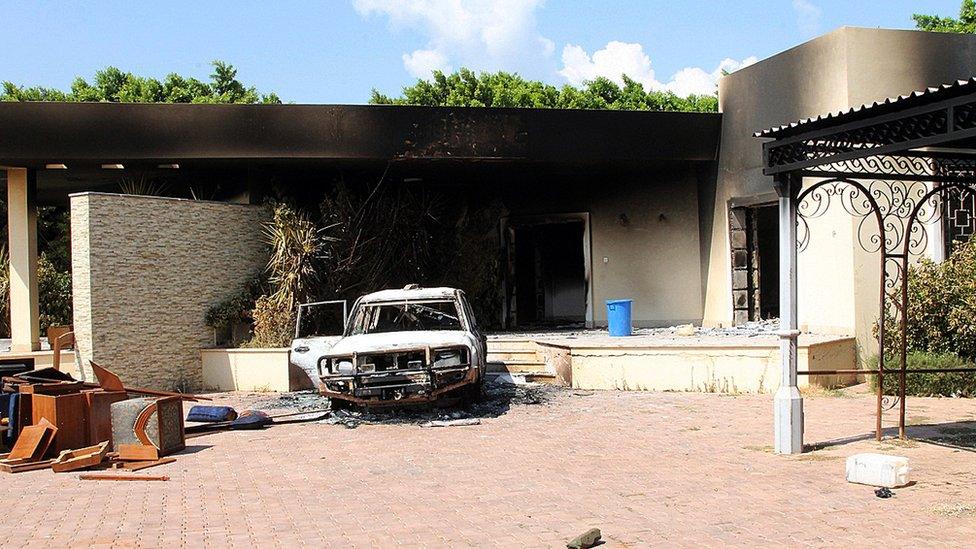
The US consulate in Benghazi was attacked and the ambassador killed
2013 August - Petroleum Facilities Guard militia begins blockade of oil export terminals.
Civil war
2014 February - Protests erupt in response to the General National Congress refusal to disband after mandate expires.
2014 April - Petroleum Facilities Guard militia lifts closure of two oil terminals.
2014 May - "Libyan National Army" renegade general Khalifa Haftar launches military assault including airstrikes against militant Islamist groups in Benghazi; tries to seize parliament building, accusing Prime Minister Ahmed Maiteg of being in thrall to Islamist groups.
2014 June - Prime Minister Maiteg resigns after supreme court rules his appointment illegal.
New parliament chosen in elections marred by a low turn-out attributed to security fears and boycotts; Islamists suffer heavy defeat. Fighting breaks out between forces loyal to outgoing GNC and new parliament.
2014 July - UN staff pull out, embassies shut, foreigners evacuated as security situation deteriorates. Tripoli international airport is largely destroyed by fighting.
Ansar al-Sharia seizes control of most of Benghazi.
Islamic State intervenes
2014 October - UN Secretary-General Ban Ki-moon visits to continue UN-brokered talks between the new parliament and government based in Tobruk and Islamist Libya Dawn militias holding Tripoli. UN says 100,000s displaced by clashes.
Islamic State extremist militia seizes control of port of Derna in eastern Libya.
2015 January - Libyan army and Tripoli-based militia alliance declare partial ceasefire after UN-sponsored talks in Geneva.
2015 February - Egyptian jets bomb Islamic State targets in Derna, a day after the group there released a video showing the beheading of 21 Egyptian Christians.
Libyan Army offensive to retake Derna in March fails to dislodge the group. IS establishes control over port-city of Sirte, halfway along coast between Tripoli and Benghazi.
2015 July - A Tripoli court sentences Gaddafi's sons Saif al-Islam and eight other former officials to death for crimes committed during the 2011 uprising against his father. He is later freed by an armed group.
2016 January - UN announces new, Tunisia-based interim government, but neither Tobruk nor Tripoli parliaments agree to recognise its authority.
Islamic State group attacks Ras Lanuf oil terminal, threatens to move on to Brega and Tobruk.
Rise of General Haftar
2016 March - New UN-backed Government of National Accord arrives in Tripoli by boat after opposing forces block airspace.
2016 April - UN staff return to Tripoli after absence of nearly two years.
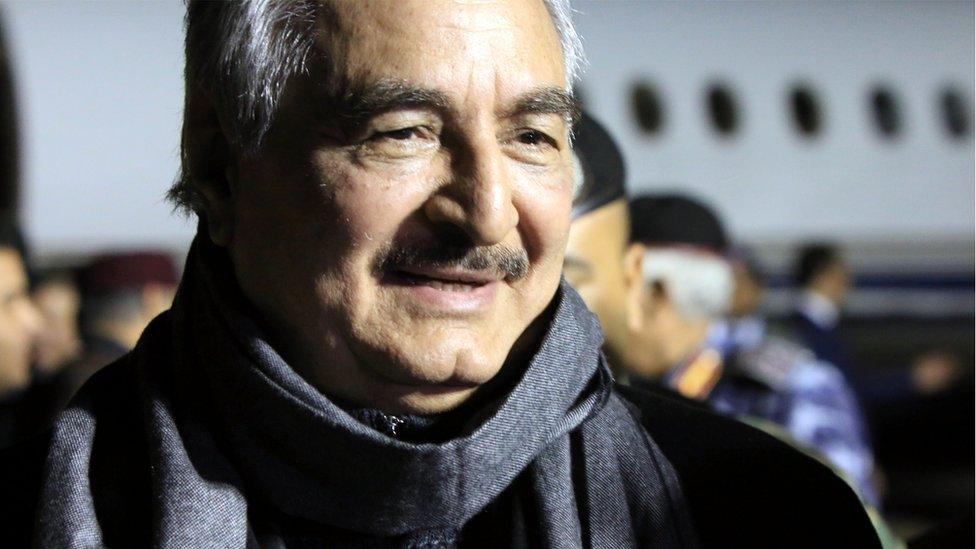
Khalifa Haftar has featured prominently in the post-Gaddafi conflict, and is de-facto leader of the east
2016 September - Libyan National Army of Khalifa Haftar seizes key oil export terminals in the east.
2016 December - Pro-government forces oust Islamic State militants from coastal town of Sirte, which they had seized 18 months previously.
2017 July - Islamic State group ejected from Benghazi after three years of fighting.
2018 July - Khalifa Haftar claims that his forces are fully in control of Derna, the last Islamist stronghold in the east and the only city in the region hitherto outside his control.
2019 April - The Haftar Libyan National Army advances on Tripoli, sparking clashes with the forces of the internationally-recognised Government of National Accord.
2020 June - UN-backed government drives Haftar forces out of Tarhouna, their last stronghold in the west of the country near Tripoli.
2021 March - Abdul Hamid Dbeibeh takes over as prime minister of the UN-backed Government of National Accord in Tripoli.